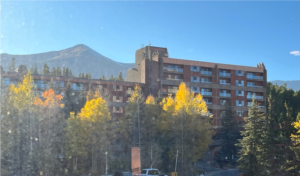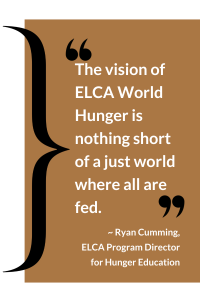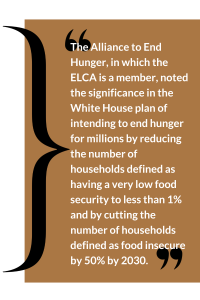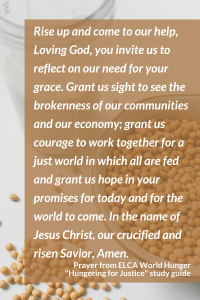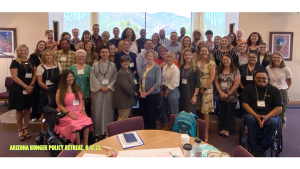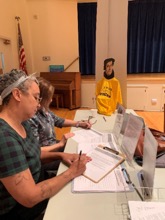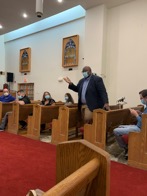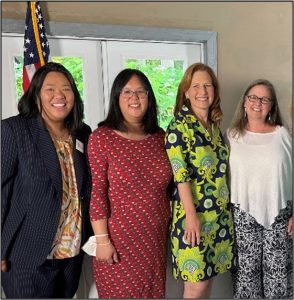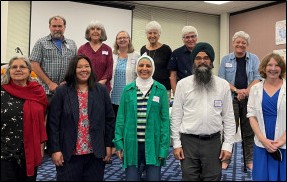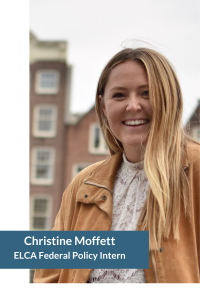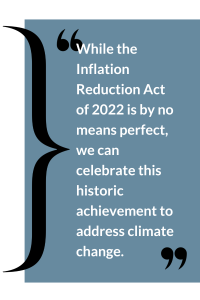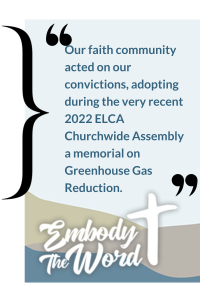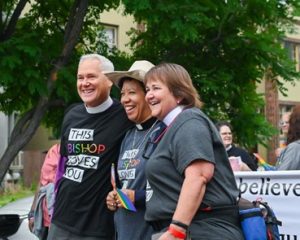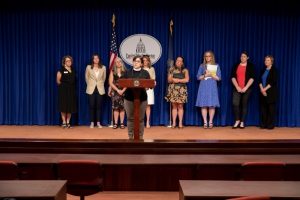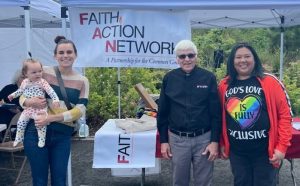Following are updates shared from submissions of the Lutheran Office for World Community and state public policy offices (sppos) in the ELCA Advocacy Network this month. Full list and map of sppos available.
U.N. | CALIFORNIA | COLORADO | FLORIDA | MINNESOTA | OHIO | PENNSYLVANIA | WASHINGTON
U.N.
Lutheran Office for World Community (LOWC), United Nations, New York, N.Y. – ELCA.org/lowc
Christine Mangale, Director
The Third Committee of the General Assembly
- The seventy-seventh session of Third Committee of the General Assembly, which deals with Social, Humanitarian and Cultural issues has been meeting since September 29th following the conclusion of UNGA77 high level meetings. This year’s session is chaired by His Excellency José Alfonso Blanco Conde of the Dominican Republic.
- The Committee has robust agenda items and like in previous sessions, is focusing on the examination of human rights questions, including reports of the special procedures of the Human Rights Council. Agenda items include the advancement of women, the protection of children, indigenous issues, the treatment of refugees, the promotion of fundamental freedoms through the elimination of racism and racial discrimination, and the right to self- determination. The Committee also addresses social development issues related to youth, family, aging, persons with disabilities, crime prevention, criminal justice, and international drug control.
- This October, the Committee is also interacting with special rapporteurs, independent experts, and chairs of working groups as mandated by the Human Rights Council.
- The Committee will consider several draft resolutions per agenda item. Last year, 62 draft resolutions were adopted at end of the session. LOWC is following closely the sessions and coordinating with the LWF Action for Justice unit.
- The formal meetings are webcast live on UN Web TV
CALIFORNIA
Lutheran Office of Public Policy – California (LOPP-CA) – lutheranpublicpolicyca.org
Regina Banks, Director
Several pieces of legislation signed into law at the end of September focused on the Lutheran Office of Public Policy – California’s key priority areas. One such bill the office has been following, Assembly Bill 2183, significantly improves the rights of farm workers. Specifically, the law will now allow farm workers to vote in union elections by mail and guarantee their protection in such elections. Additionally, Senate Bill 731 addresses the criminal justice pillar: the new law expands criminal record relief for all felonies if the individual is no longer on a probationary sentence, which also includes some specific exemptions to the relief depending on the crime. One critical bill our office was supporting and advocating for, Senate Bill 222, would have required the Department of Community Services and Development to provide water affordability assistance to low-income residents. This bill was unfortunately vetoed by the governor. Other priority bills, including Senate Bills 854 and 464 and Assembly Bills 2180, 2589, and 1615 remain in the committee process.
Looking ahead: Our office’s 2022 voter guide for the upcoming November election has been published on our website and Facebook page as a resource for California voters as they prepare to vote on several propositions.
COLORADO
Lutheran Advocacy Ministry Colorado (LAM-CO) – lam-co.org
Peter Severson, Director
LAM-CO PUBLISHES 2022 VOTER GUIDE: The Lutheran Advocacy Ministry Colorado 2022 Voter Guide is here! We’re providing up to date info and thoughtful reflection on all eleven ballot measures that will face Colorado voters this fall. In addition, the LAM-CO Policy Committee has voted to take positions on four of the measures:
- YES on Prop FF, Healthy School Meals. Creates and funds the Healthy School Meals for All program, providing free school meals to all public school students by capping income tax deductions for individuals earning $300,000 or more per year.
- YES on Prop GG, Amount of Tax Owed Table for Initiatives. Requires ballot titles and fiscal impact summaries for initiatives affecting income tax to include information on how the change would affect different income levels.
- YES on Prop 123, Dedicated Revenue to Affordable Housing Programs. Create the State Affordable Housing Fund and allocates 0.01% of existing income tax revenue to fund housing and homelessness programs through it.
- NO on Prop 121, State Income Tax Reduction. Reduces the state income tax from 4.55% to 4.40%.
HOUSING COLORADO CONFERENCE: Director Peter Severson represented LAM-CO at the Housing Colorado Conference in Breckenridge, a three-day event bringing together housing justice advocates, policy experts, builders, and government officials to discuss Colorado’s ever-present housing and affordability crisis, and to explore new opportunities and ideas together.
FLORIDA
Florida Council of Churches – floridachurches.org
The Rev. Russell L. Meyer, Executive Director
The damage from Hurricane Ian stretched across Florida, and flooding is still possible along rivers as 20 inches or more of rain flows out to sea. Congregation damages from the storm on the west coast include:
- St. Peter, Fort Myers Beach: Building mostly destroyed.
- Faith, Lehigh Acres: half of sanctuary roof lost.
- Living Waters, North Port: Water damage throughout facility and across campus.
- Hope, Port Charlotte: Facility walls and roofs breached.
- Emmanuel, Venice: Water intrusion damage through broken stained-glass window and tree damage to roof.
Thousands of families, not displaced by lost homes, struggle with food access. Please support Lutheran Disaster Response! Across Florida Ian has exasperated a housing crisis. Learn more about complex housing factors and public education strains in the Clergy Convening 11/14-15 in Orlando: https://floridachurches.org/how-are-the-children/
MINNESOTA
Lutheran Advocacy – Minnesota (LA-MN) – lutheranadvocacymn.org
Tammy Walhof, Director
Coalition Work: This fall, several of our coalitions are reorganizing and rethinking structures. Many participant organizations have had a fair amount of turnover, and some of our longer-term leaders have moved on to other types of work. We are also debating whether to keep last years’ agendas, or reconsider policy options and strategies (Remember that little was accomplished last session due polarization and midterm election posturing.)
Midterm Elections: As much as 40 percent (or more) of the state legislature could be new following November’s election. Redistricting pitted several incumbents against each other, not just those from opposing parties, but also within parties. Although a few legislators went head-to-head in the primaries, several incumbents retired or left to pursue other interests. Pandemic weariness also likely contributed to retirement decisions. Given this large turnover, the education needed with new legislators will be daunting. Even bills that were completely negotiated between Republicans and Democrats, House members and senators (but never brought to a final vote in last hours of the legislative session), will need to start the whole process again. Furthermore, several of the legislators that retired were those that had friendships across the aisle, were respectful of colleagues regardless of party/ideology, and were long-term experienced negotiators. Moderates of both major parties make up large numbers of those who have left.
Polarization: Given widening gaps, Tammy Walhof is dusting off her Graceful Engagement workshop, and exploring techniques of Braver Angels to get people talking and relating despite differences and hopefully to work civilly with one another
OHIO
Hunger Network Ohio (HNO) – hungernetwork.org
Deacon Nick Bates, Director
Join the fight for hunger free schools in Ohio!
The Hunger Network is collaborating with Children’s Defense Fund, the Ohio food banks and many others to fight for hunger-free schools in Ohio by providing free meals to all students. Universal meals mean:
- Full bellies leading to full minds! This plan guarantees that kids have access to nutritious food each and every day.
- Less paperwork – I would rather our shared public resources be used on filling plates instead of pushing paperwork.
- Community building – The approach reduces stigma, judgement, and delays in graduation based on school lunch debt or the inability to pay.
YOU CAN JOIN US BY CLICKING HERE!
Advocacy in Advent!
Join us and the Ohio Council of Churches on November 29th for an in-person advocacy day at 9:30. We will begin the day at Trinity Episcopal Church in Columbus across the street from the Ohio Statehouse.
Thank You!
We are grateful for great partners across Ohio. Recently we joined the East Ohio Conference of the United Methodist Church and the Ohio Council of Churches for their Black Theologian Day.
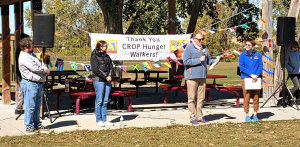
Deacon Nick Bates of the Hunger Network joins the Rev. Dr. Jack Sullivan, Jr. of the Ohio Council of Churches to reflect on a powerful morning presentation.
We are also grateful to partner with the Columbus CROP Walk and the invitation to provide opening remarks and to cut the ribbon!
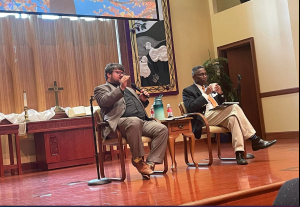
Deacon Bates of the Hunger Network joins other faith and hunger leaders in Central Ohio to give thanks for dedicated people who are taking steps every day to end hunger.
PENNSYLVANIA
Lutheran Advocacy Ministry – Pennsylvania (LAMPa) lutheranadvocacypa.org
Tracey DePasquale, Director
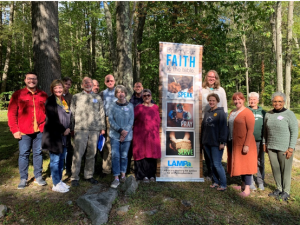
“It’s always so good to be together — to be grounded in prayer and worship, and to share stories of what is happening in our congregations, communities and families,” said LAMPa Director Tracey DePasquale.
The Laurel Highlands served as a beautiful backdrop for LAMPa’s Policy Council retreat at Camp Sequanota in September. The council received updates on legislative action and discussed possible policy priorities for the next term, based on what they are witnessing in their communities and synods.
The Policy Council began a preliminary examination of LAMPa’s ministry and advocates network survey to help guide their development of priorities for adoption in December. Members also heard from Lutherans Restoring Creation about the resources for supporting our growing network of green teams and the greenhouse gas memorial that was approved at August’s Churchwide Assembly. Continuing the focus on just transitions, the council learned about the implications of new federal infrastructure and environmental funding for Pennsylvania.
Responding to requests for ways to stay in relationship in spite of disagreement, Policy Council also heard from Julie Boler, Director of Community Relations for Braver Angels. A small team is exploring the possibilities for collaboration and training for congregations and communities.
Also, in the past month, LAMPa equipped advocates with information on expanding eligibility for programs to address food insecurity, opportunities to act on homelessness though the Homeless Remembrance Blanket Project at the U.S. Capitol, and ways to help ensure a smooth, safe and accessible election in Pennsylvania.
WASHINGTON
Faith Action Network (FAN) – fanwa.org
Elise DeGooyer, Director
FAN staff attended in-person and online the White House Conference on Hunger, Nutrition, and Health in September. We will work with our colleagues across the nation and with the Washington State Anti-Hunger & Nutrition Coalition as the Healthy Meals, Healthy Kids Act and Farm Bill take shape in Congress. We are promoting the release of the Washington Immigrant Relief Fund, which will support immigrants who were not eligible for other pandemic relief funds. And we look forward to promoting the Working Families Tax Credit in our faith communities to reach people who are eligible for this new state cash assistance program—a policy change we worked to enact for more than a decade.
During this interim time between legislative sessions, Policy Engagement Director Kristin Ang has put together some appointments for constituents with their legislators, in preparation for the 2023 legislative session. Our legislative agenda is beginning to take shape as coalition partners finalize their proposals and begin to find legislative champions for bills.
Supporting all this good work, we were able to hire a new full-time employee, Blake Alford, as Operations Coordinator. He has recently moved from Indiana and has a background in food justice, racial equity, as well as education advocacy.
Fall also brings the opportunity to gather for our Annual Dinner! This year it will be hybrid on Sunday evening, November 20, in Renton, Spokane, and online. With the theme of Pathways of Solidarity, you are welcome to join online from anywhere! Register at bit.ly/FANDinner2022.

